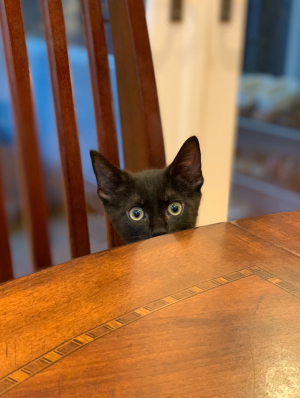Cat supremacy: Allow me to purr-suade you
September 21, 2021
Grumpy Cat. Lil BUB. And, the latest meme sensation, salad-hating Smudge.
If an alien browsed the Internet’s cornucopia of cat content, they would surely think the average human loves cats. And yet, cats seemingly have a worse reputation than their canine counterparts. Mistaken for being aloof, insensitive and apathetic, cats are woefully misunderstood.
This nonsensical contempt toward our feline friends stems from a place of deeply rooted ignorance and unwillingness to widen one’s perspectives. For one, the common belief that cats are antisocial animals has been disproved in multiple studies. A 2019 study on the attachment bonds between domestic cats and humans showed a higher percentage of cats being securely attached to their humans than the percentage of dogs’ secure attachment bonds to their humans in a similar study. Compared to 58% of dogs displaying secure attachments to their caretakers, 64.3% of the kittens and 65.8% of adult cats in the study showed secure attachment bonds to their caretakers.
Despite being very independent, my own little furball Taro loves to spend time with people, though he would (probably) never admit it. From ceaselessly trotting over my keyboard during Zoom classes to now dashing out of the bushes next to the driveway to surprise me upon my return back from school to settling into my lap to take his evening naps as I do homework, Taro never fails to rejuvenate me even after the most exhausting of days.
Friendships between cats and humans are also more genuine and profound than those between dogs and humans. A 2017 study showed that, unlike dogs, who are very easily motivated by food and toys, both pet and shelter cats preferred to interact with humans over interaction with food, scent or toys.

My personal experience affirms these results—while Taro is not one to pass on a juicy chunk of chicken, he also refuses to eat unless in the presence of a human and will meow incessantly until someone accompanies him to his food bowl. These results prove that not only are cats social creatures just like dogs, but they may even have a higher propensity toward forming permanent and long-lasting connections with their respective humans.
Okay, so cats love their owners as much as dogs do. But a dog lover who especially hates cats may argue that cats are not friendly toward strangers, which makes them less appealing than dogs, right?
Wrong. In a 2019 study on the effects human attention and familiarity had on cat sociability, researchers found that cats whose humans gave them more attention would, as a result, spend more time with the person. This result was true not only when cats were paired with their caretakers, but also when cats were paired with strangers. Yes, cats are as sociable as dogs—no matter what human they interact with.
Not only are cats as social and amiable as dogs, but they also have the potential to improve the health of their humans outside of the health benefits observed in any person who owns a pet. That’s right, cats have magical healing powers.
In a 2001 study of the purpose of cats’ purring, researchers found that the frequencies at which domestic cats purred overlapped with the frequencies of vibrations that can promote bone growth or tissue repair. The frequencies also aligned with vibrations used in therapeutic medicine for humans. So, not only can cats heal themselves, but they can also heal and calm their humans with their purring. Can dogs do such a thing? I believe not.
Finally, the bond between a cat and a human is especially precious due to the history of cat domestication compared to that of dogs. Cats, unlike the artificial and human-selected domestication of dogs, self-domesticated via natural selection after observing a benefit in living close to or on human settlements. This development is especially profound because domestic cats come from ancestors who are more individualistic, unlike dogs who come from pack animals. Domestic cats’ behavior has adapted in a way that diverges from their ancestors just to be with humans.
A friendship between a cat and a human can be just as rewarding, if not more rewarding, than one with a dog. Seeking to understand cats, from their habits to their needs, will result in a much more gratifying relationship. As they say, dogs drool, and cats rule.


















![“[Building nerf blasters] became this outlet of creativity for me that hasn't been matched by anything else. The process [of] making a build complete to your desire is such a painstakingly difficult process, but I've had to learn from [the skills needed from] soldering to proper painting. There's so many different options for everything, if you think about it, it exists. The best part is [that] if it doesn't exist, you can build it yourself," Ishaan Parate said.](https://harkeraquila.com/wp-content/uploads/2022/08/DSC_8149-900x604.jpg)




![“When I came into high school, I was ready to be a follower. But DECA was a game changer for me. It helped me overcome my fear of public speaking, and it's played such a major role in who I've become today. To be able to successfully lead a chapter of 150 students, an officer team and be one of the upperclassmen I once really admired is something I'm [really] proud of,” Anvitha Tummala ('21) said.](https://harkeraquila.com/wp-content/uploads/2021/07/Screen-Shot-2021-07-25-at-9.50.05-AM-900x594.png)







![“I think getting up in the morning and having a sense of purpose [is exciting]. I think without a certain amount of drive, life is kind of obsolete and mundane, and I think having that every single day is what makes each day unique and kind of makes life exciting,” Neymika Jain (12) said.](https://harkeraquila.com/wp-content/uploads/2017/06/Screen-Shot-2017-06-03-at-4.54.16-PM.png)








![“My slogan is ‘slow feet, don’t eat, and I’m hungry.’ You need to run fast to get where you are–you aren't going to get those championships if you aren't fast,” Angel Cervantes (12) said. “I want to do well in school on my tests and in track and win championships for my team. I live by that, [and] I can do that anywhere: in the classroom or on the field.”](https://harkeraquila.com/wp-content/uploads/2018/06/DSC5146-900x601.jpg)
![“[Volleyball has] taught me how to fall correctly, and another thing it taught is that you don’t have to be the best at something to be good at it. If you just hit the ball in a smart way, then it still scores points and you’re good at it. You could be a background player and still make a much bigger impact on the team than you would think,” Anya Gert (’20) said.](https://harkeraquila.com/wp-content/uploads/2020/06/AnnaGert_JinTuan_HoHPhotoEdited-600x900.jpeg)

![“I'm not nearly there yet, but [my confidence has] definitely been getting better since I was pretty shy and timid coming into Harker my freshman year. I know that there's a lot of people that are really confident in what they do, and I really admire them. Everyone's so driven and that has really pushed me to kind of try to find my own place in high school and be more confident,” Alyssa Huang (’20) said.](https://harkeraquila.com/wp-content/uploads/2020/06/AlyssaHuang_EmilyChen_HoHPhoto-900x749.jpeg)








